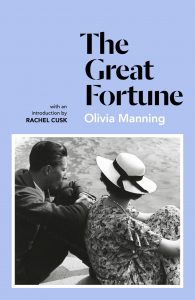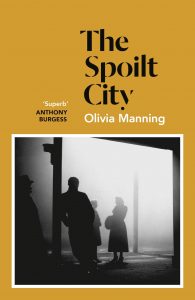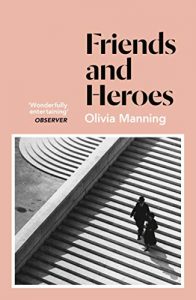 Comprising: The Great Fortune, The Spoilt City, Friends and Heroes
Comprising: The Great Fortune, The Spoilt City, Friends and Heroes
Published by Windmill, Penguin Random House 11 February 2021
Paperback, £8.99 each
Reviewed by Elizabeth Hilliard Selka
Like many of my generation, I came to The Balkan Trilogy through Fortunes of War, the magnificent BBC television dramatization broadcast in 1987. This melded Olivia Manning’s three novels known together as The Balkan Trilogy with the following three which continued the story of Harriet and Guy Pringle’s adventures into The Levant Trilogy. Though the six volumes make one narrative, there is a clear break between the two trilogies, and in fact Olivia Manning wrote them many years apart, Balkan published in the early to mid-1960s and and Levant between 1977 and 1980. The production values of the BBC’s Fortunes of War were outstanding, as was its cast, the latter a roll-call of British acting talent, and famous particularly for Emma Thompson and Kenneth Branagh having fallen in love on set in the lead roles. Reader, she married him.
To a teenage ingénue, this liaison charmingly mirrored and reinforced the tension of our protagonists’ shifting on-screen relationship. Guy has met Harriet on his summer holiday at home in England from his job (funded by the Organization) teaching English at the university in Bucharest; the first novel, The Great Fortune, opens with the young couple newly plighted and travelling by train across Europe to Romania. The Organization is Manning’s name for the British Council, which did in fact employ Olivia Manning’s husband RD ‘Reggie’ Smith.
The novels are autobiographical and thus offer us a riveting insider’s view of the confusion in Eastern Europe in the first year of the Second World War – and the insider, herself an outsider, is Harriet. Woven into the day-by-day unsettling  upheavals of the politics and practicalities of war is the story of Harriet’s marriage, her growing understanding of the man she has so suddenly married and revelations about the unforseeable complexities of love. The day after the BBC televization finished I fell upon the six novels and consumed them hungrily, devouring the additional riches of character and drama, detail and nuance afforded by some thousand printed pages.
upheavals of the politics and practicalities of war is the story of Harriet’s marriage, her growing understanding of the man she has so suddenly married and revelations about the unforseeable complexities of love. The day after the BBC televization finished I fell upon the six novels and consumed them hungrily, devouring the additional riches of character and drama, detail and nuance afforded by some thousand printed pages.
Now Windmill Books, an imprint of Penguin Random House, have reissued the trilogy as individual novels, The Great Fortune (with introduction by Rachel Cusk) followed by The Spoilt City and finally Friends and Heroes. Quite apart from these books being easier to stuff in one’s handbag (the trilogy is a bit of a doorstop), this reissue offers an opportunity not only to revisit the oeuvre after some decades but also to consider the novels afresh as individual works. Moreover, in the intervening years I have myself gained experience of marriage, if not of war (unless one allows this weird past year-or-more of unprecedented world-wide panic and devastating lockdowns, censorship and moral indignation as a parallel of sorts), so I was interested to discover if coming to the works with more worldly experience altered their personal fascination for me. Would I find Harriet’s experiences here described dated or irrelevant, her inexperience and innocence tiresome and her emotions unconvincing, now that I was myself a wise old(er) woman?
 Besides Harriet and Guy, The Balkan Trilogy is peopled with as sublime a cast of theatrical characters as any Dickens novel, so many of them that in a less meticulous writer one might lose track. There is the repellent Professor Lord Pinkrose, dazzling Bella Niculescu, rapacious Sophie, masterful ‘Dobbie’ Dobson, repellent Dubedat, melancholy Alan Frewin… The most fascinating is impoverished scrounger Prince Yakimov. ‘Your poor Yak’, as he refers to himself, appears in the very first chapter and, finally, in almost the last. He is magnificent, provoking extreme emotions in the reader as in Harriet – like some of the most compelling people in real life he is maddening yet irresistible, childlike and egregiously selfish but never dull – and was based on Julian Maclaren-Ross, whom John Betjeman described as ‘one [of] the most gifted writers of his generation’. Manning knew Ross and transforms the drink-and-drug fuelled flamboyant spendthrift into the son of an Irish mother and Tsarist father.
Besides Harriet and Guy, The Balkan Trilogy is peopled with as sublime a cast of theatrical characters as any Dickens novel, so many of them that in a less meticulous writer one might lose track. There is the repellent Professor Lord Pinkrose, dazzling Bella Niculescu, rapacious Sophie, masterful ‘Dobbie’ Dobson, repellent Dubedat, melancholy Alan Frewin… The most fascinating is impoverished scrounger Prince Yakimov. ‘Your poor Yak’, as he refers to himself, appears in the very first chapter and, finally, in almost the last. He is magnificent, provoking extreme emotions in the reader as in Harriet – like some of the most compelling people in real life he is maddening yet irresistible, childlike and egregiously selfish but never dull – and was based on Julian Maclaren-Ross, whom John Betjeman described as ‘one [of] the most gifted writers of his generation’. Manning knew Ross and transforms the drink-and-drug fuelled flamboyant spendthrift into the son of an Irish mother and Tsarist father.
Yakimov’s perennially distinguishing feature is his sable-lined greatcoat (‘I wonder, did I tell you that the Czar gave it to m’poor old dad?’) which we watch become ever more ragged as the novels progress. The evolution of Harriet’s relationship with Yakimov over the course of the three novels is, after her marriage, the most poignant marker of her unfolding circumstances and maturity, more so than the changes wrought by her quasi-love affair with Charles Warden. On reading again after so long, I find that I am moved as much by Yakimov’s life and (spoiler alert) death (he goes to his grave wrapped in the wretched greatcoat) as by Harriet’s devotion to Guy.
For Guy is a man glamorous and generous, who in his prime cannot be satisfied with one person but must gather round him and give of himself to as many like-minded people as possible – how indeed such men exist in the real world, and what a risk we take in marrying them! Harriet discovers Guy to be consequently neglectful and careless of her happiness. Yet it is wartime, and with so much changing around them they hold fast to each other and remain loyal, discovering that in spite of everything they do love each other. This complexity I find if possible deeper and more moving rather than less so, coming again to the novels with more experience of the shifting sands of human nature as revealed in impermanent real-life relationships. In the real world and in spite of their both having affairs, Olivia Manning and Reggie Smith viewed their marriage as immutable and remained together for more than 40 years till her death in 1980.
The Balkan Trilogy is a slow-burn psychological thriller. Great Fortune starts with Harriet’s arrival in Bucharest and ends with Guy’s triumphant production of Shakespeare’s Troilus and Cressida and the chilling announcement as the crowds emerge from the theatre that ‘Paris has fallen’… Spoilt City begins ten months after Great Fortune, in a hot June 1940; it is a tense, waiting drama, a web of political machinations concerning Germany’s increasing demands over Bessarabia and Romanian food production, and personal devastation in the fall of Guy’s Jewish friends the Druckers. It ends with Harriet evacuated from Bucharest to Athens alone without Guy but with Yakimov as a friend. In Friends and Heroes, Harriet and Guy are reunited, but Harriet is drawn to Charles Warden; after months of cold, humiliation and privation Harriet and Guy narrowly escape Greece for Egypt.
Though I could not undo my knowledge of each previous volume, I did pause and read other work between the novels, yet I was quickly drawn in afresh each time and found I was impatient to immerse myself again in Harriet’s life and loves, however painful. I believe there are sufficient explanations to satisfy anyone arriving unwittingly at the second or third volume. What did delight me and which I had barely noticed in my immature reading was to some extent Manning’s dry humour but above all her physical immediacy, her relish of the colours, sights, smells and flavours of Harriet’s world. The Balkan Trilogy is revealed to be not only clear-sighted, immersive and moving in charting parallel marital and societal disintegration and (for Harriet and Guy at least) redemption, but also an intensely observant and sensual work. Rich and delicious – an undoubted feast, possibly a masterpiece.
